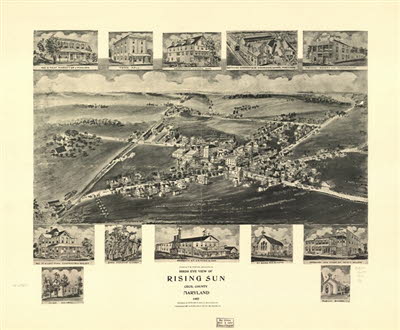Origins of Rising Sun
 From its crossroads genesis in the 1720s until the Mason-Dixon line was established, the town now known as Rising Sun was actually located in Chester County Pennsylvania. The taxes were paid in West Chester, Pennsylvania, and all the early deeds and records are still recorded there. The town occupied part of what were the controversial "Nottingham Lots" claimed by William Penn and given to his Quaker friends in 1702 over the vigorous objection of Maryland's Calverts. Messrs. Mason and Dixon settled the dispute by determining that the area in question was indeed a part of Maryland.
From its crossroads genesis in the 1720s until the Mason-Dixon line was established, the town now known as Rising Sun was actually located in Chester County Pennsylvania. The taxes were paid in West Chester, Pennsylvania, and all the early deeds and records are still recorded there. The town occupied part of what were the controversial "Nottingham Lots" claimed by William Penn and given to his Quaker friends in 1702 over the vigorous objection of Maryland's Calverts. Messrs. Mason and Dixon settled the dispute by determining that the area in question was indeed a part of Maryland.Records show that, around 1720, Henry Reynolds established a stone tavern on Nottingham Lot No. 17 to serve as a stage stop. Over the entrance was a swinging sign depicting the rays of the sun at dawn and the lettering THE RISING SUN. It was around this busy tavern that the village of Summer Hill began to grow.
Located along the direct route between Baltimore and Philadelphia, the tavern enjoyed growth in its popularity as a meeting place for business deals, political maneuvering, elections, and sundry other activities. Travelers and locals alike adopted the habit of saying "We'll meet at The Rising Sun." The phrase was so entrenched by the time the town's first post office was established around 1815, that Summer Hill yielded to Rising Sun as the official name of the place. It is likely that the post office was actually located in the tavern.
· Irish - 16%
· English - 8%
· Italian - 6%
· Dutch - 6%
· Polish - 4%
· French (except Basque) - 4%
· Scotch-Irish - 3%
· Scottish - 2%
· Welsh - 1%
· Finnish - 1%
· Swedish - 1%
· Black or African American - 1%
Recent News
- March 12 2024 Town Meeting Agenda
- February 27, 2024 Town Meeting Agenda
- COVID -19 TOWN SERVICES ACTION PLAN #4Provides an update to a confirm Covid-19 case in Town limits, closing of Town Parks & recommended safe practi...
- COVID -19 TOWN SERVICES ACTION PLAN #3Closing of Town Park Equipment for public use
- COVID 19 - TOWN SERVICES ACTION PLAN - #2Summarizes Governor Hogan's executive orders and additional steps being taken by the Town of Rising Sun
Upcoming Events
- MAYOR & COMMISSIONERS - TOWN MEETING12/10/245:30 pm - 11:59 pm
- MAYOR & COMMISSIONERS - TOWN MEETING12/10/245:30 pm - 11:59 pm
- MAYOR & COMMISSIONERS - TOWN MEETING01/14/255:30 pm - 11:59 pm
- MAYOR & COMMISSIONERS - TOWN MEETING01/14/255:30 pm - 11:59 pm
- TOWN HOLIDAY - MARTIN LUTHER KING DAY01/20/25 All Day
In this Department
 Department Home
Department Home